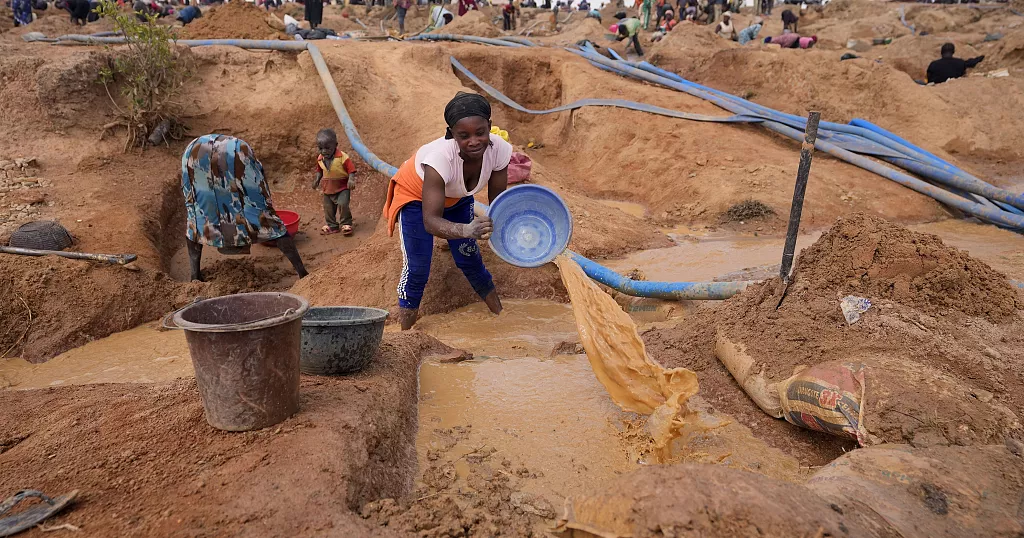Ghana Faces Nationwide Lockdown Amid Escalating Illegal Mining Crisis
3 min read
A woman works at an Illegal tin mining site in Jos, Nigeria.

A woman works at an Illegal tin mining site in Jos, Nigeria.
Ghana is bracing for a nationwide lockdown on September 30, driven by escalating protests from civil servants and labor unions against illegal mining, commonly referred to as “Galamsey.” The rampant environmental damage resulting from these unregulated mining operations has sparked urgent calls for government intervention, including a proposed state of emergency in mining regions and the revocation of mining licenses.
Recent findings from the Ghana Water Company Limited (GWCL) reveal a dire situation, with critical water shortages emerging due to the contamination of vital water sources. GWCL reports that approximately 60% of the nation’s major water bodies have been polluted, leading to unprecedented turbidity levels in water treatment systems. These levels have surged to an average of 14,000 NTU, far surpassing the treatment capacity of 2,000 NTU.
A coalition consisting of civil society organizations, labor unions, media representatives, and religious leaders is ramping up pressure on the government to take decisive action. Their demands include declaring a state of emergency in affected areas, deploying security forces to remove illegal miners from water sources, and immediately canceling mining licenses.
Dr. Kenneth Ashigbey, the Convener of the Ghana Coalition Against Galamsey, highlighted the urgency of the situation, likening the pollution of water to a war crime. “When you go to war and poison the enemy’s water, it’s considered a war crime. But here, people are poisoning their own water, and the leaders are failing to act. This is a crisis, and the president must act now,” he emphasized. Albert Kwabena Dwumfour, President of the Ghana Journalists Association, shared similar sentiments, urging the military’s deployment to affected areas and the cancellation of all mining permits in ecologically sensitive zones.
The impact of illegal mining extends beyond water contamination; it has wreaked havoc on agricultural land, particularly in cocoa-producing regions, and has resulted in the destruction of at least 34 forest reserves. These actions threaten not only the environment but also the livelihoods of communities that depend on agriculture and clean water.
As Ghana prepares for the impending lockdown, the government faces mounting pressure to address the escalating crisis. Citizens and advocacy groups are looking to the authorities for prompt and effective measures to mitigate the environmental degradation that jeopardizes the country’s water security and agricultural productivity.
Public sentiment is increasingly leaning toward a demand for transparency and accountability from the government regarding the illegal mining operations that have proliferated in recent years. Many citizens are frustrated by what they perceive as inaction or insufficient measures taken by the government to tackle the Galamsey issue. This sentiment is amplified by reports of health risks associated with contaminated water, with many communities experiencing rising cases of waterborne diseases.
The proposed lockdown, though a drastic measure, reflects the urgency of the situation and the collective frustration of Ghanaians who are witnessing the adverse effects of illegal mining. It serves as a wake-up call for authorities to prioritize environmental protection and public health.
As the lockdown approaches, all eyes will be on the government’s response to this multifaceted crisis. Activists and concerned citizens are hopeful that the lockdown will lead to more stringent regulations and enforcement against illegal mining activities. The future of Ghana’s natural resources, agricultural viability, and overall public health hangs in the balance, necessitating immediate and sustained action from the authorities.
The situation underscores the need for comprehensive policies that not only combat illegal mining but also promote sustainable mining practices that can benefit local communities while preserving the environment. Ghana stands at a crossroads, and the choices made in the coming days will have lasting implications for its people and the environment.